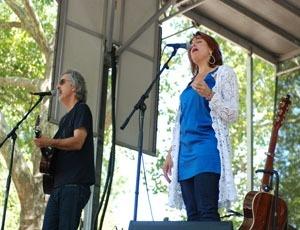Rosanne Cash on Music, Tradition, and the Episcopal Church
Rosanne Cash performed a July 4th concert on Governors Island that was sponsored by Trinity Wall Street. Cash's most recent album, "The List," features songs from a list of the 100 country songs that Cash's father, Johnny Cash, gave her when she was 18-years-old and told her she needed to know.
How long have you lived in New York?
Twenty years. A long time.
You were born in Tennessee and grew up in Southern California. What made you stay in New York for twenty years?
I'm a New Yorker. You know that saying: we always thought she was kind of weird, turns out she's just a New Yorker. That's me.
During the concert you sang "Ode to Billie Joe" and said that if there had been a 101st song on "the list," this would have been it. How did you pick that particular song?
There was a project called The Briar and the Rose several years ago, where they compiled all of these great ballads of American roots music. They asked me to pick one to sing, so I chose "Ode to Billie Joe." It's a narrative that is so cinematic. It's a time and place, a period piece, that's important to remember.
What are some of the songs that you would put on your list, for your children?
There would definitely be a Dylan overlap but I would have to add the Beatles, of course. I grew up in Southern California listening to a lot of pop and rock, so maybe "Tiny Dancer" by Elton John would make my list. I'd have to have a lot of Neil Young.
You mentioned during the concert that your daughter recently released an album. What lesson about music do you hope you've passed along to her and to the rest of your children?
The main lesson I know I've passed on is to be ecumenical in your tastes. She listens to everything from Dolly Parton to Leonard Cohen to the Sex Pistols to bluegrass. She has no judgment about genre and I taught her that.
I was listening to your Black Cadillac album. So many of those songs deal with searching and with big questions about life. How does faith come into play for you, in that?
I am a seeker. I'm very comfortable with the questions; I don't have to have all the answers. I don't know that I believe in a personalized God, but where art and music comes from is a big enough God for me. Whatever that is, it's big enough for me.
Is that something that you've come to over time?
Oh, yeah. I explored everything. I was raised Catholic. I went through my New Age phase, I went through my Buddhist phase. When I go to church I go to an Episcopal Church, actually. I go to St. Luke's [St. Luke in the Fields, Manhattan]. All my girls went to school there. In fact, my oldest daughter just got married there. You can bring your beliefs there and they're fine with it. Or you can bring your non-beliefs and they're fine with it. That's what I love about them. That's what I love about the Episcopal Church, too – it's very ecumenical.
We often find ourselves talking about tradition in the Church. Coming from the musical legacy that you're part of, what is your take on tradition?
When I was young, I wanted nothing to do with tradition. I was all about being new, being original, finding my own way. Then, as you get older, you find this rich source of comfort and inspiration that you deny for all those years while you're finding yourself. Which is totally appropriate – young people aren't supposed to glom onto tradition yet. But when you do receive it, after pushing it away for a long time – which is what I did – it's so incredibly rich and humbling. There's nobody who's original, you know what I mean? You find that out and you go, well, I am unique, if not original, and there's this whole bedrock of love and music and honor and integrity that I can tap into.
--Interview by Nicole Seiferth, assistant editor for website and parish publications.
